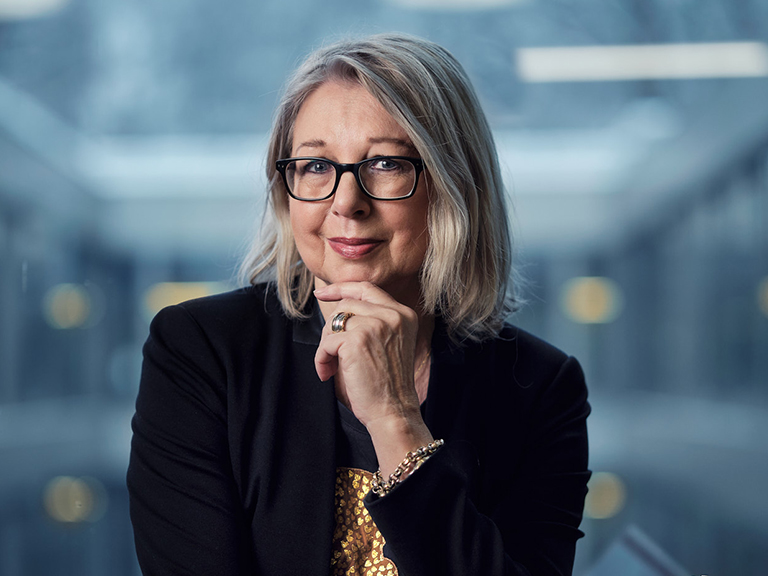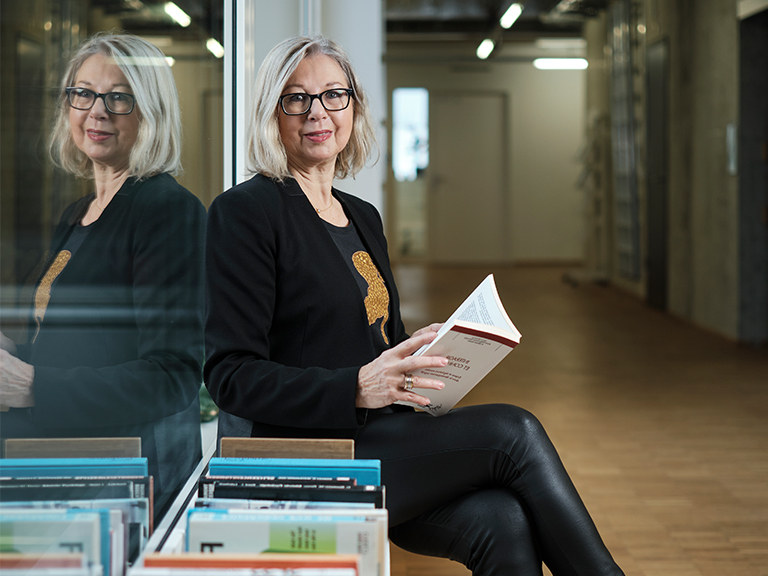Developmental psychology
Family, love and friendship – about the power of bonding
The way we love and bond with each other has a lot to do with the family in which we grew up. How does its structure shape us, how does it benefit us in life, and how can attachment patterns be overcome? Developmental psychologist and family therapist Pasqualina Perrig-Chiello knows the answer.

Pasqualina Perrig-Chiello: Enjoy it, savor love, it’s something wonderful, a huge power that can do many things. But I don’t really want to give advice – advice can also be a blow. That’s why I wouldn’t say there could be a B minor later.
Why are close interpersonal relationships of such fundamental importance to us? In psychology, they are considered a basic need.In short, we are social beings. We can’t survive alone, certainly not as children. Family ties have always guaranteed our survival. Attachment and care are important, above all the need to belong – to feel a “sense of belonging”, as it is described in specialist literature.
What is a family from a developmental psychology point of view?A family is a community of destiny that has a lasting impact on individual development. We cannot choose our family; we are born into and shaped by their social circumstances – regardless of our genetic make-up, which accounts for around 30%. The family determines values and behavior. It's in the family that children learn what is right and what is wrong, and also what love is.
What makes a happy family?Trust in each other. If a child can trust its parents and the parents can trust the child, that is half the battle for the rest of your life. And, of course, positive emotions, especially love. Love is a broad concept and includes devotion, a warm climate of understanding, listening and caring. Thirdly, reciprocity and commitment, i.e. the ability to give and take. Knowing that I will receive something when I give something, and what I can expect in return. Ultimately, there is also a balance between mutual support and demand and, at the same time, having the freedom to develop personally.
How does that pay off?Children with secure, i.e. strong, reliable and trusting, ties to their parents or other primary caregivers generally have better well-being and health as adults. Even their life expectancy is higher on average than that of people who were unable to develop a secure attachment as children. Luckily, research shows, however, that the majority of children – around 60% – are securely attached.
About the person
Pasqualina Perrig-Chiello
was Professor of Developmental Psychology at the University of Bern from 2003 until her retirement in 2016. Her research focuses include the developmental psychology of life span and familial intergenerational relations. Pasqualina Perrig-Chiello was elected to AcademiaNet in 2012 and was President of the Senior Citizens' University Bern from 2017 to 2022, where she now serves as Vice President. The trained family therapist is a sought-after interview partner for leading German-language media and is currently writing a book about the major transitions in life.
Contact
Prof. em. Dr. Pasqualina Perrig-Chiello
pasqualina.perrigchiello@unibe.ch
In der Familie üben wir von klein auf unser Bindungsverhalten ein. Die Eltern leben uns dieses vor, sowohl beim Umgang mit uns als Kindern sowie mit sich als Paar. Diese Bindungsmuster werden nachweislich in der Regel an die nächste Generation weitergegeben. Die Forschung zeigt zudem eindrücklich, dass die negativen Vorbilder stärker und nachhaltiger wirken als die positiven. Menschen, die als Kinder unsicher gebunden waren, haben später mit grosser Wahrscheinlichkeit mehr Mühe in Liebesbeziehungen als sicher gebundene. Und Kinder, deren Eltern eine schlechte Beziehung hatten und sich scheiden liessen, haben ein grösseres Scheidungsrisiko. Leider ist aber der Umkehrschluss nicht zulässig: Kinder aus Nichtscheidungsehen haben keine Garantie, dass sie eine lange, glückliche Ehe führen können.
Lassen sich denn keine Veränderungen im Bindungsverhalten über die Lebensspanne hinweg beobachten?Die Lebenslaufforschung zeigt, dass wir die in der Kindheit erlernten Bindungsmuster mitnehmen, als Schemata, wie Beziehungen funktionieren. Sie prägen unsere sozialen Beziehungen im beruflichen und im privaten Leben – unsere berufliche Laufbahn, unsere Freundschaften, unsere Partnerschaften und unser Verhalten gegenüber den eigenen Kindern. Aus der Forschung, insbesondere aus Langzeitstudien – etwa der Entwicklungspsychologin und Resilienzforscherin Emmy Werner – wissen wir aber auch, dass es Ausnahmen gibt, und vor allem auch, dass spätere Korrekturen möglich sind.
«Negative role models have a stronger and more lasting effect than positive ones.»
In our own family, we practice our attachment behavior from an early age. Parents set an example for us, both when dealing with us as children and with themselves as a couple. These bonding patterns are generally proven to be passed on to the next generation. Research also impressively shows that the negative role models have a stronger and more lasting effect than the positive ones. People who were insecurely attached as children are more likely to find it harder to have romantic relationships than those who were securely attached. And children whose parents had a bad relationship and got divorced are at greater risk of divorce themselves. Unfortunately, however, the reverse is not true: Children with parents who are not divorced have no guarantee that they will be able to have a long, happy marriage.
Are there no changes in attachment behavior over a person's lifetime?Lifecycle research shows that we take with us the attachment patterns learned in childhood, as schematics of how relationships work. They shape our social relationships at work and in our private lives – our professional careers, our friendships, our partnerships and our behavior towards our own children. However, we also know from research, particularly from long-term studies – such as those of developmental psychologist and resilience researcher Emmy Werner – that there are exceptions and, above all, that subsequent corrections are possible.
Would you endorse the statement that it's never too late for a happy childhood?As a representative of positive psychology, I am inclined to say: Yes! However, I must add right away: It’s not easy. A person with poor starting conditions must encounter a good environment and be emotionally intelligent enough to be able to take advantage of potential offers from the environment for their own development. Psychological resilience is not innate, but is the result of the interaction of personal strengths and external offerings: for example, in the form of a teacher or family doctor who notices that something is wrong in the family and does something about it.
What does it take for an adult to be able to overcome the imprints of childhood?On the one hand, they need a supportive social environment, a partner, friends. We also need a society that, like Switzerland, offers the framework conditions for this. Anyone growing up in a war zone has very little chance. And it takes – and this is the decisive factor – a self-reliant being. People are not a plaything of fate or circumstances, but can largely shape their own development. This requires faith in self-efficacy, and this can be recognized even if it was not experienced in childhood.
Please explain this in more detail.Even though a certain vulnerability remains, we can develop character strengths that can compensate for the negative experiences of childhood – such as self-confidence, gratitude, hope, farsightedness, compassion, spirituality or humor. The crucial point is self-awareness and thus a recognition of this vulnerability. The crises in our lives offer us the opportunity to do this: They teach us where we are vulnerable, but also what our strengths are and how we can draw hope. In the best-case scenario, we learn how to control ourselves better. This allows us to overcome old patterns and learn new ones. Research shows that self-control improves with age. In the best-case scenario, we get better and better at dealing with crises.

Well, families have always existed in many different shapes and shades. And patchwork families were more common than today, because many mothers died early and the fathers remarried. Whatever form families take, it is interesting that people are always looking for the same thing: reliability and care through loyalty. Basic needs do not change over the millennia.
But where do you see changes?I see a positive development in the fact that there is no longer any normative constraint regarding the formation of a family and the form of a family. Many people deliberately remain childless or single. We live in a society that is not only increasingly individualized, but also singularized – but in return we have elective families and close relationships with caregivers who are not blood relatives. Greater freedom of choice will make elective kinships more important. Legislation is already playing its part here: Family carers are no longer just spouses and children, but are increasingly also life partners without a marriage certificate, good friends or neighbors.
Is the conventional family dying out?I don’t see the end of the family. I see a revival. If we take a closer look, we see not only a greater variety of family forms, but also an increasing number of people who want to return to a traditional family. This scientifically confirmed trend is also reflected in the data from the Federal Statistical Office. Many women in Switzerland reduce their workload or give up gainful employment altogether when they become mothers in order to take care of the children and the household. It is clear that men initially intend to become more involved in the family and household when they become a father. Most of the time, however, good intentions are all that remain. Maybe it’s the working conditions – I don’t know either.
«Self-awareness is the key to overcoming old patterns.»
Retraditionalization can also be seen in marriage behavior. In addition to couples who renounce marriage altogether, there are those who celebrate engagement and marriage very traditionally. A development that is incomprehensible to my generation, which broke away from these traditions.
Have we not become more flexible with regard to gender roles? The new visibility of the LGBTQI* community also contributes to this. And young people seem to identify less through the category of gender.When it comes to the definition of gender identity, a lot is changing in young people. Unlike in previous generations, the binary sex – male or female – is increasingly being questioned and publicly discussed. This is a welcome change because it removes the taboo of an issue that affects a community that has always existed and has always been discriminated against – something that is still the case even today. The liberalization of discourse has led to more and more young people seeking medical help because they are uncertain about their gender identity. However, it must be added that oscillating between the sexes and sexual orientations or exploring boundaries during the transition to adulthood is completely normal, but this has been taboo until now.
And how does gender identity develop later in life?The fact is that the understanding of gender roles also changes over the course of life. Gender roles, for example, are increasingly questioned when people reach middle age. Both women and men break out of certain constraints and the stress of gender roles, and the interpretation of “male” and “female” becomes broader. In fact, we see many coming-outs when people reach middle age.
Do you think it is possible that the division of people into two genders will eventually become obsolete?No. The polarity of male versus female has fascinated mankind for thousands of years and will continue to fascinate mankind in all its facets.
«When men and women reach middle age, they break out of gender role stress, and the interpretation of “male” and “female” becomes broader.»
Friendship is characterized by a close interpersonal relationship based on empathy, common interests and reciprocity. Love is accompanied by romantic feelings, falling in love, passion and the desire for commitment. But love changes over the years. When trust develops out of infatuation, and consistency and mutual support are added, it can come close to what we understand by friendship. For example, in old age, when sexuality no longer plays a central role, but a couple is there for each other.
So the demarcation is not always so clear?We live in a time when the boundaries between love and friendship are actually blurring. This is the case with the “Friendship Plus” model, which includes friendship and a sexual relationship. This model seems to me to be more non-committal. But psychologically speaking, we humans are not meant to be non-committal. This can work for a while, if we’re all right. But if we are in bad shape, non-commitment can become ambivalence – what are we to each other? - and that is something we might not want to tolerate.
Does that mean that we are bound by love?Psychologically, yes. I am often asked if we owe our parents anything. My belief is that we basically owe nothing to our parents. We weren’t asked when we were born into the family. Nevertheless, love obliges us, not in the moral and ethical sense, but in the sense of a psychological need: I don’t have to, but I want to give something back. When I don’t have to do anything, I’m actually much more challenged. Because then I have the freedom to get involved. And if I want to get involved, I do it because I love.
New magazine uniFOKUS

Subscribe free of charge now!
This article first appeared in uniFOKUS, the new University of Bern print magazine. Four times a year, uniFOKUS shows what academia and science are capable of. Thematically, each issue focuses on one specialist area from different points of view and thus aims to bring together as much expertise and as many research results from scientists and other academics at the University of Bern as possible.
The online magazine of the University of Bern

Subscribe to the uniAKTUELL newsletter
The University of Bern conducts cutting-edge research on topics that concern us as a society and shape our future. In uniAKTUELL we show selected examples and introduce you to the people behind them – gripping, multimedia and free of charge.